Faith, Ethics and AI: Shaping a Future for Global Peace –
A Side-Event to the 2024 United Nations General Assembly
Event | September 2024
Religious leaders and their communities have a long-standing history of engaging with the ethical and moral implications of technology, especially when it intersects with issues of peace and security. On the sidelines of the 2024 United Nations General Assembly (UNGA), the Multifaith Advisory Council (MFAC) Peace and Security Working Group hosted a side event on the theme of, “Faith, Ethics and AI: Shaping a Future for Global Peace.” Providing a platform for religious actors, technology experts, policymakers and broader civil society to convene on the nuances of artificial intelligence and its intersection with religion. This side event showcased intersectional dialogue on practically ensuring a multi-stakeholder approach in developing policies and programs that address autonomous weapons systems (AWS) and other technological impacts to advance global peace and security.
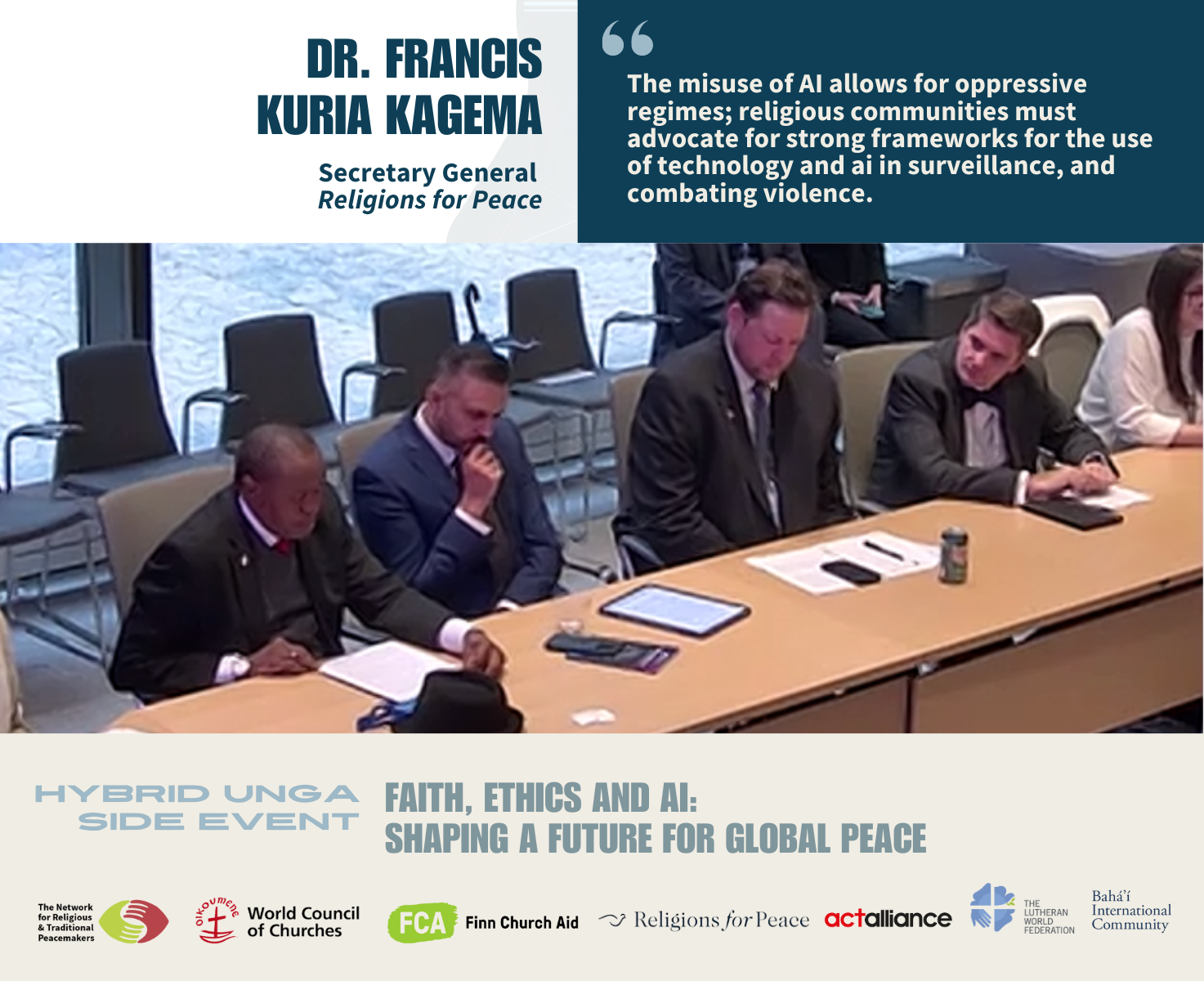
Dr. Francis Kuria Kagema, Secretary General at Religions for Peace
Dr. Francis Kuria, Secretary General at Religions for Peace offered opening remarks, highlighting the connection between religious freedom and prosperity in countries, emphasizing the need for “justice, equality, and compassion,” advocating for the voices of those left behind when developing and regulating new technology in support of global peace. He also stressed the significance of transparency, accountability, and the human element of review to ensure AI is developed with ethical and moral principles. Dr. Kuria championed the necessity of greater religious engagement in these processes, aligned with the moral responsibility of religious leaders to champion the principles of non-discrimination and ‘Do No Harm,’ considering the risk of AI and emerging technologies exasperating conflict and inequality without proper moderation.
“The misuse of AI allows for oppressive regimes; religious communities must advocate for strong frameworks for the use of technology and AI in surveillance, and combating violence.”
–Dr. Francis Kuria Kagema
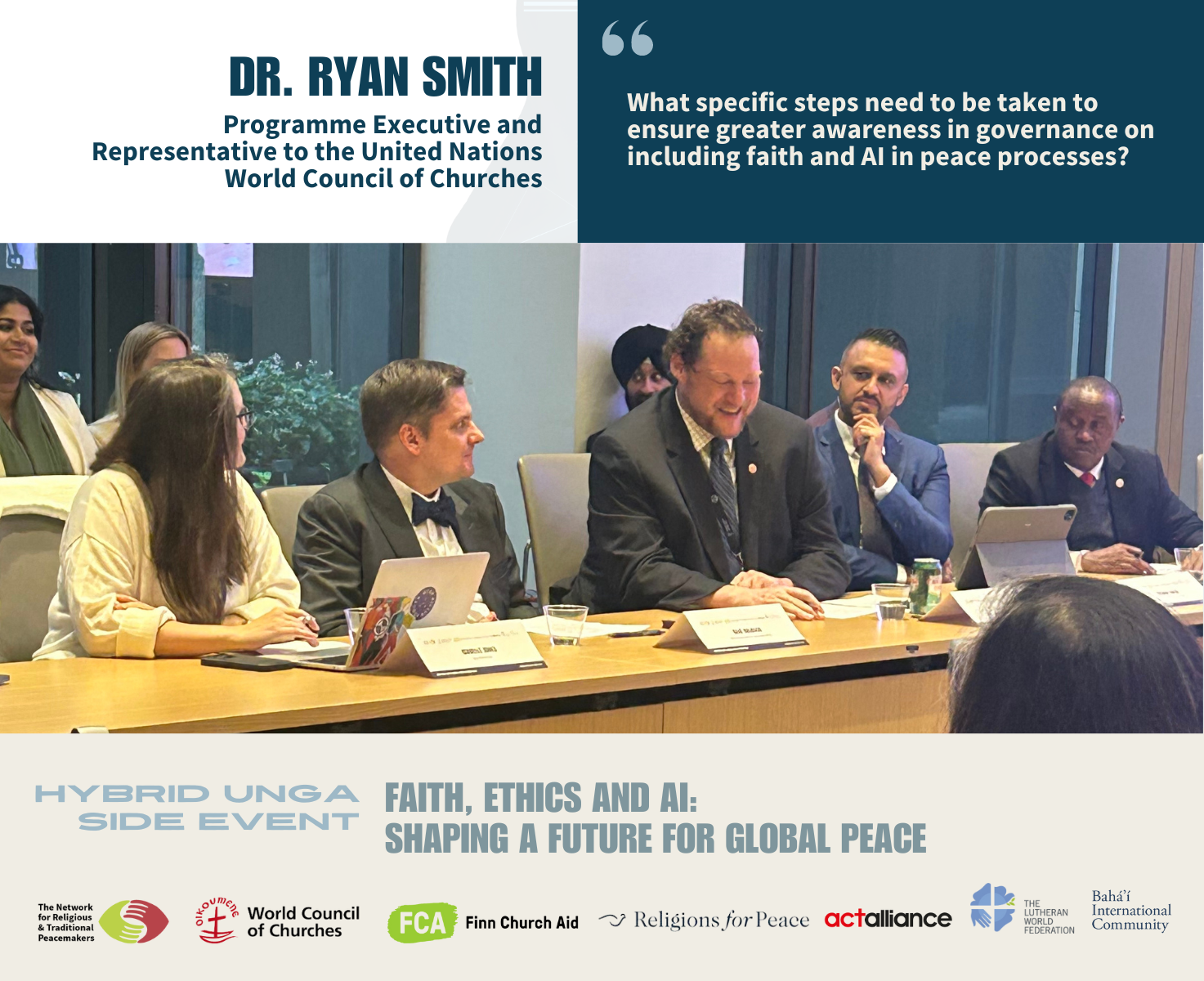
Dr. Ryan Smith, Programme Executive and Representative to the United Nations World Council of Churches
The panel discussion thus began, moderated by Dr. Ryan Smith, Programme Executive and Representative to the United Nations in New York for the World Council of Churches. The panel featured two civil society advocates and a representative from the United Nations Office for Disarmament Affairs.
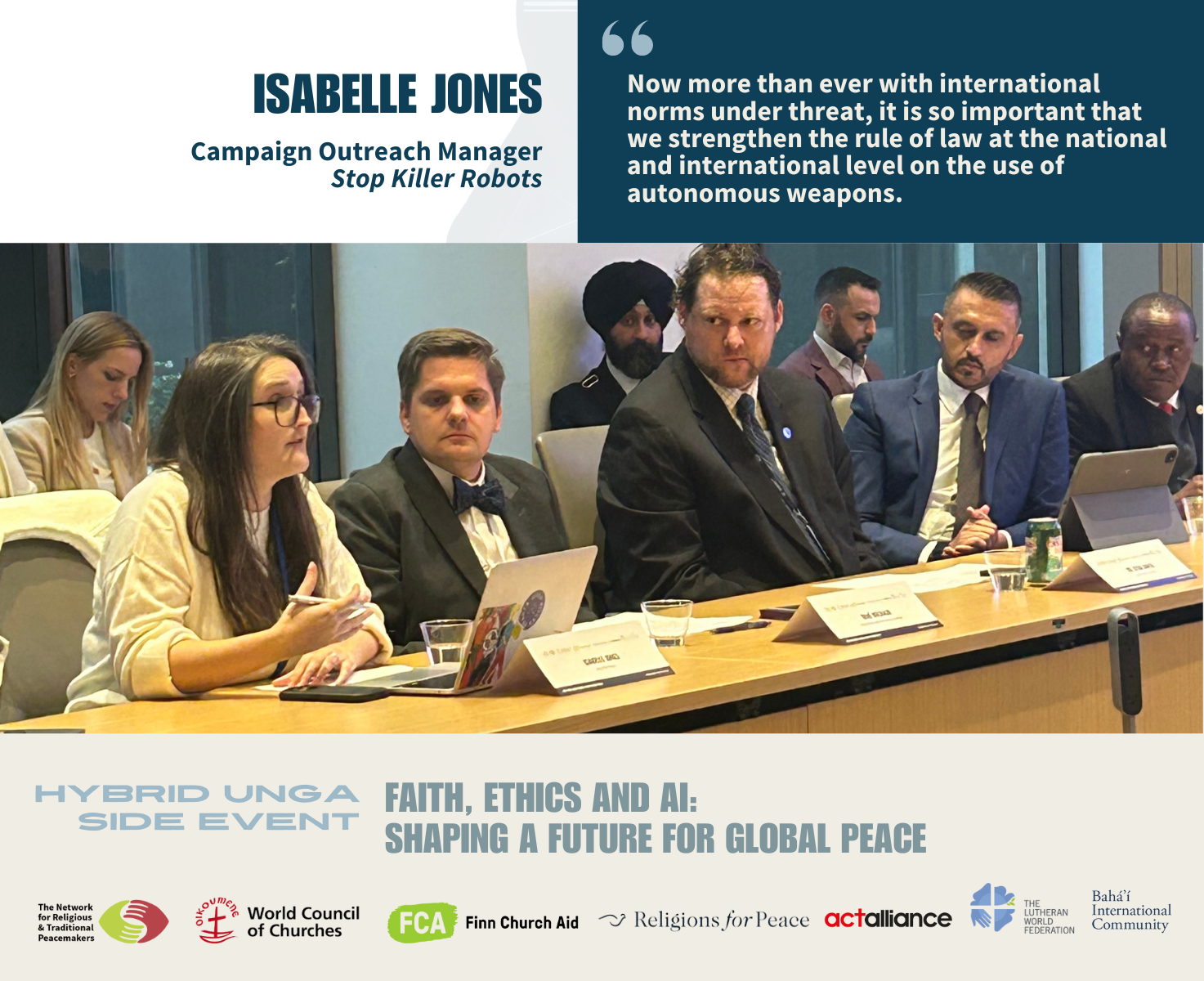
Isabelle Jones, Campaign Outreach Manager at Stop Killer Robots
Isabelle Jones, Campaign Outreach Manager at Stop Killer Robots, discussed her work as part of a global coalition working on lobbying, policy, and advocacy for laws regarding autonomous weapons, emphasizing the moral and ethical concerns of taking the human element away from the use of force. Jones stressed the need for action to codify ethics into the regulation and development of technology calling for increased accountability and civil society participation, “to take responsibility for the technologies we create and the way they impact our lives.”
“Now more than ever with international norms under threat, it is so important that we strengthen the rule of law at the national and international level on the use of autonomous weapons.”
–Isabelle Jones
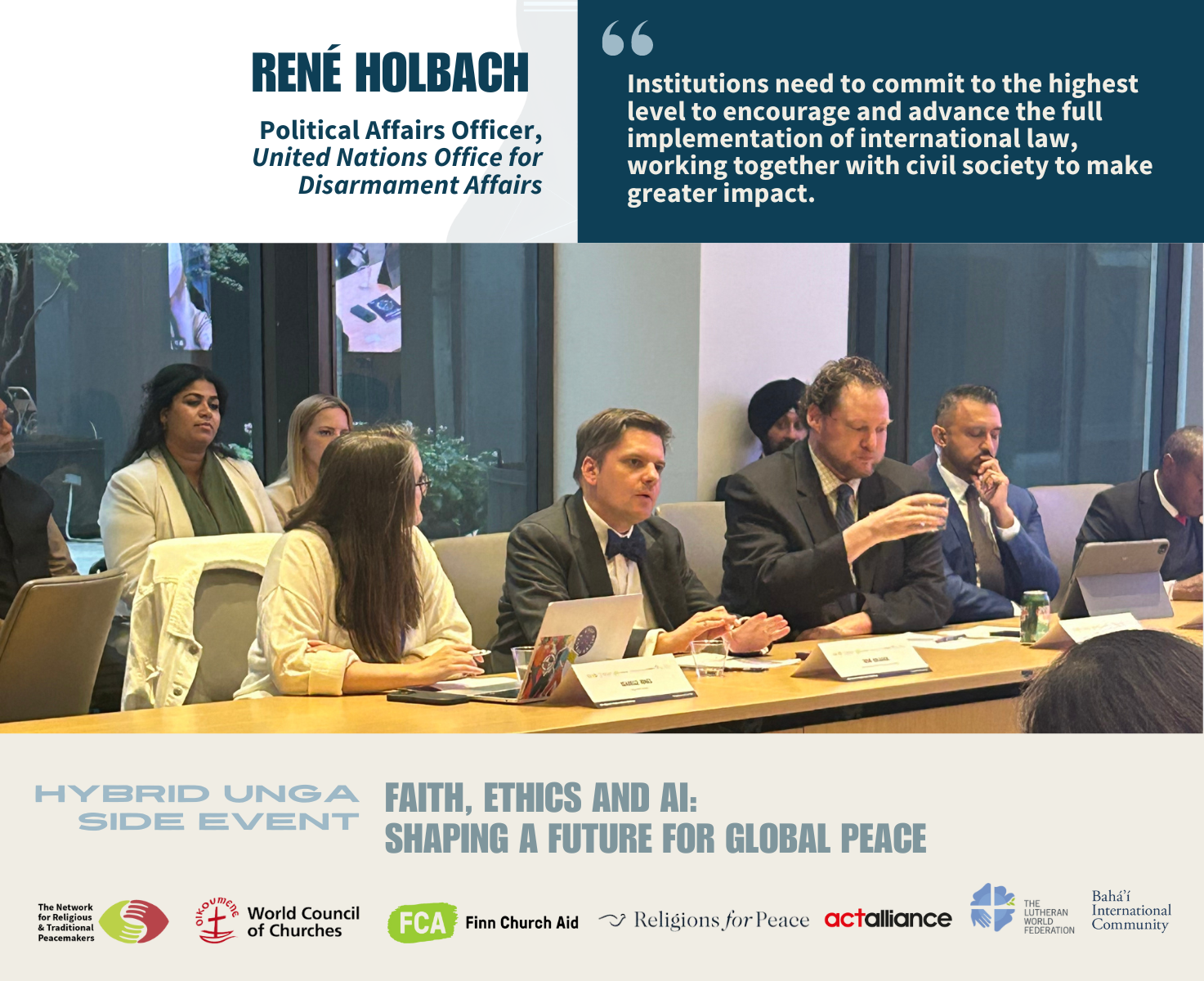
René Holbach, Political Affairs Officer at the United Nations Office for Disamament Affairs
René Holbach, Political Affairs Officer in the Science, Technology and International Security Unit of the United Nations Office for Disarmament Affairs (UNODA) discussed the UNODA’s work with “the dark side of technology” that could pose a risk to human security, considering the potential risks and threats these technologies pose to international peace and security, including a call for a new legally binding instrument on the use of autonomous weapons in addition to existing law on human rights and conflict. Holbach highlighted that the Pact states a commitment to advancing in discussions on laws regarding autonomous weapons and emerging technologies, with the Secretary-General calling for a “more networked multilateralism” to make these processes more accessible, including engaging with private sector and faith actors. Holbach further underpinned this call for inclusive and ethical processes, stating that the United Nations, “is firmly on the temporal side of things, not the spiritual side of things,” but ethics have still been essential to this conversation and “the law is how we express our ethical and moral preferences.”
“Institutions need to commit to the highest level to encourage and advance the full implementation of international law, working together with civil society to make greater impact.”
–René Holbach
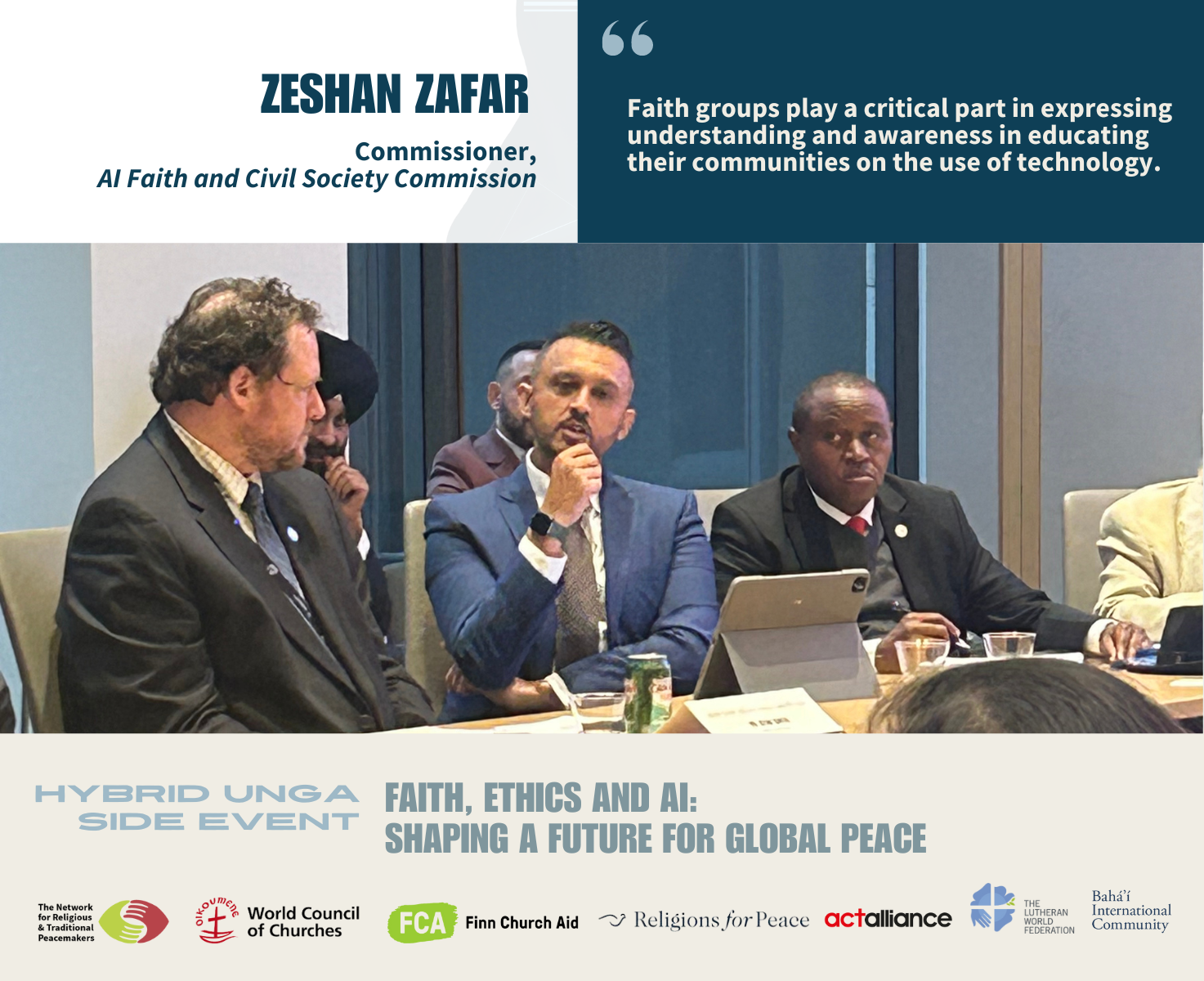
Zeshan Zafar, Commissioner for the Civil Society Commission
Zeshan Zafar, Commissioner for the AI Faith and Civil Society Commission and Executive Director at the Abu Dhabi Forum for Promoting Peace discussed his work supporting an interfaith response to the Rome Call and the practical application of ‘algorethics,’ introducing ethics to algorithms. Zafar emphasized the need for more inclusive AI design with data representative of diverse social realities, and the valuable role of faith actors in gathering and sharing that information. Zafar supported that tech companies have been showing openness to engaging with faith-based organizations in discussions on the ethical and spiritual ramifications of emerging technologies. Zafar further emphasized the need for religious engagement in ensuring that lessons learned on the ground are brought into discussions on regulating autonomous weapon systens, ensuring that ethical guidelines and the preservation of cultures are built into these conversations, with a call to, “build virtues into algorithms.” In case you missed the event, you can watch the recording here.
“Faith groups play a critical part in expressing understanding and awareness in educating their communities on the use of technology.”
–Zeshan Zafar
Follow the Network on social
